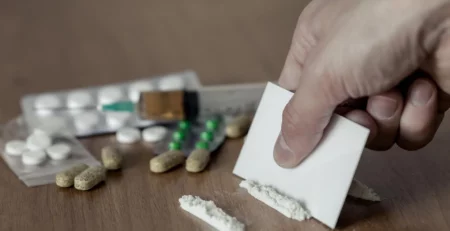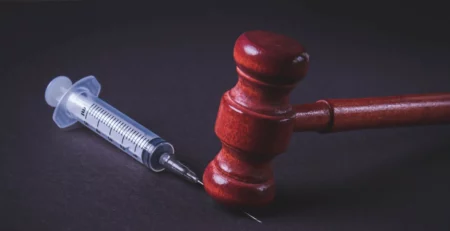Who are the Friends of Doctor Bob and Bill W?
Understanding AA Lingo and Ways to Identify Others in Recovery
If you’re actively participating in alcohol addiction recovery, would you know what someone meant if they asked you if you had attempted a geographical cure for your addiction? What if they asked you which chip you were on?
Unless you were an attendee at an Alcoholics Anonymous meeting in Vegas (or anywhere else for that matter) you’d likely have no idea what these terms meant. However, being a part of this addiction recovery “fraternity,” complete with its lingo, is often one of the most positive steps someone in recovery from drinking alcohol can make.
Keep reading to get our guide on and for the ‘friends of Doctor Bob and Bill W,’ and remember to reach out to Icarus Behavioral Health in Nevada at any time for additional support and programs to assist in getting (and staying) sober!
What Is Alcoholics Anonymous?

Alcoholics Anonymous is an organization that was founded by Bill Wilson, otherwise known as Bill W. – and Bob Smith – known to AA attendees as Dr. Bob. The two started the group on the foundation of the 12 Step Program – otherwise known as the 12 Steps to Sobriety – to overcome alcoholism – as both men struggled with drinking.
Robert Holbrook Smith, Dr. Bob Smith, and Bill Wilson likely had no idea the impact their organization would have all these years later. However, even though he’s long passed – if you attend an Alcoholics Anonymous meeting, don’t be surprised if someone calls you a friend of Bill W.
Get Support for a Life Without Alcohol – Reach Out Now!
Who is a Friend of Bill W?
It almost sounds like a secret code or password one would use at a fraternity – or some other brotherhood like the Freemasons. A “Friend of Bill W.” is someone who attends Alcoholics Anonymous meetings. It’s also a way to pay homage to the “anonymous” part of the organization – as members commonly only use their first name and the first letter of their last name to introduce themselves.
And there’s plenty more where that came from. The organization that Dr. Bob and Bill Wilson started years ago has blossomed into a major component for battling alcoholism, complete with its style of language and slang. terms that members lovingly use to communicate with one another.
The Basis of AA Meetings

If you attend AA meetings of any kind regularly, one of the first things you’d hear after Friends of Bill W. or a tale of Dr. Bob and Bill’s earliest years as founders would be “12 and 12.” When Dr. Bob and Bill W. began Alcoholics Anonymous, the founding principles were known as the 12 Steps and 12 Traditions.
Dr. Bob and Bill were under the opinion (and rightfully so) that if someone subscribed to a higher power – and followed the 12 Steps and 12 Traditions, they could overcome their challenges by learning coping mechanisms and attending these regular support groups.
Often overlooked is the contribution of Anne Smith, the wife of Dr. Bob and a pioneer in her own right, she was referred to as the ‘Mother of AA’ by Bill Wilson and cited as a co-founder by both men. There is even a National Park historic site in Akron, Ohio, at the home where Anne and Dr. Bob launched many of the initial efforts for their organization.
A Worldwide Fellowship Begun by Bill Wilson and Dr. Bob Smith
And for many people, Dr. Bob and Bill were right. These fundamental ideas laid out decades ago by Dr. Bob and his cohort have helped countless amounts of those wrapped up in the throes of alcoholism reclaim their lives.
So what does the “12 and 12” consist of? Dr. Bob and Bill W. initially coined the 12 Steps as the path you walk to recovery – committing to these steps as you strive to become sober. The 12 Steps are as follows:
The 12 Steps of Alcoholics Anonymous
- We admitted we were powerless over alcohol — that our lives had become unmanageable.
- We came to believe that a Power greater than ourselves could restore us to sanity.
- We made a decision to turn our will and our lives over to the care of God as we understood Him.
- We made a searching and fearless moral inventory of ourselves.
- We admitted to God, to ourselves, and to another human being the exact nature of our wrongs.
- We were entirely ready to have God remove all these defects of character.
- We humbly asked Him to remove our shortcomings.
- We made a list of all the persons we had harmed and became willing to make amends to them all.
- We made direct amends to such people wherever possible, except when to do so would injure them or others.
- We continued to take personal inventory and when we were wrong promptly admitted it.
- We sought through prayer and meditation to improve our conscious contact with God as we understood Him, praying only for knowledge of His will for us and the power to carry that out.
The AA program and its corresponding 12 AA Tradition elements (the other half of the 12 and 12) have provided a safe space for recovering alcoholics to find friends – friends of Bill W., that is, ever since its initial founding.
The code words and unique AA jargon, along with your dedication to your anonymity, add to the unique tradition of AA and the Twelve Steps and add to its lore.
Open Dialogue and No Judgment: The Friends of Doctor Bob and Bill W

Many assume that this substance use recovery organization is a religious group. However, that couldn’t be further from the truth. The group is non-judgmental and encourages open dialogue at meetings. They don’t promote worship or force you to subscribe to a particular deity – they encourage you to surrender to your higher power because part of the journey is a spiritual awakening.
And while Friends of Bill W. take most of the medical science and psychology out of alcoholism and battle addiction with the power of something bigger than yourself – something they’ve been doing is working, as the track record of helping members stay sober speaks for itself.
After getting introduced to the terminology the co-founders coined in the beginning, you’ll find that behind the thinly veiled brotherhood of sobriety – Alcoholics Anonymous is a place that encourages you to get in touch with your spiritual side to promote an “awakening experience-” which is most likely what the outside world would call a “Moment of Clarity.”
It is worth noting that Narcotics Anonymous and NA meetings, came along decades later than Alcoholics Anonymous but are inspired by and share many of the same attributes and core precepts. But let’s get back to AA and share more lingo from “The Program.”
Get Proven Detox and Alcohol Treatment Options – Call Now!
“Work the Program” and Other Terms from Meetings
“The Program” is just another way to describe the 12 Steps. Part of “The Program” is understanding the “Three Legacies.” This trio of moral actions includes recovery, as the only initial rule is that you’re willing to stop drinking alcohol. The second Legacy is unity – because you’re all Friends of Bill W, obviously the Program promotes unity and friendship.
Finally, the third and final Legacy is service – as they encourage you to be in service to your brothers in AA and help them along their recovery journey.
This means you provide support when needed, help them keep up hope and faith in their journey, and ensure they continue to focus on attending meetings. When you work the Program, one of the most important elements is holding one another accountable.
A Tight-Knit Community that Trudges a Path to Happy Destiny
The community of AA and other 12-step programs is tight-knit, and many members end up meeting outside of the designated AA Meetings. Many end up carpooling together – and some become lifelong best friends as a result of the support in this recovery community.
Alongside these friendships come code word groups and phrases allowing you to recognize a fellow sobriety-seeker, such as the heading above. “Trudging the road to happy destiny” is a quote directly from the Big Book!
Additional Bill W. and Bob Smith AA lingo is listed below and comes in pretty handy if you’re thinking about joining the community.
Common Recovery Slang at Support Meetings for AA Members
Recovery and the Big Book
One of the first things you’ll be introduced to is almost guaranteed to be the Big Book. The Big Book of Recovery is where all the information regarding 12 and 12 is contained – outlining the 12 Steps, the 12 Traditions, and the Three Legacies.
Sponsor
Your sponsor is generally the one who introduced you to this expansive recovery network. All Friends of Bill W. usually start with a sponsor – and they end up taking you under their wing during your initial introduction to meetings. Ultimately, your sponsor becomes a pillar of support, and your go-to at any time, day or night, whenever you feel weak and you might drink.
Your sponsor holds you to the ultimate level of accountability, as they give you much of their time and energy to help keep you on the straight and narrow. Think of a sponsor as almost an on-call, 24-hour counselor, best friend, and big brother.
Fellowship
Fellowship is a term used by members to describe the program itself. You might hear someone at meetings refer to the organization as a whole as “The Fellowship.” Makes sense – since essentially, that’s what you’re going there to experience.
Chips
The chips – one of the cornerstones of AA meetings. Chips are a coveted prize in this support community. When friends and each separate co-founder started AA, one of the ways that Bill W. and the Dr. kept track of their sober time was through the use of specialty-made poker chips. This ultimately evolved to keychains as well – but chips are still the preferred regalia.
For example, there’s a white chip that signifies your commitment or the beginning of your recovery journey. Yellow typically marks 30 days, red is 90, green is 9 months. and bronze is 1 year.
“Hi, I’m ______, and I’m an Alcoholic”

One of the first things that new members do – before actively participating in the open dialogue – is stand up, and introduce themselves in the following manner:
“Hi, I’m (First Name), (Last Name Initial), and I am an alcoholic.” This is part of the person laying down and surrendering, and finally admitting that their addiction is bigger than them and they’re ready to quit fighting. And while currently, the word “alcoholic” is almost frowned upon in the recovery space and has been substituted for alcohol use disorder – the term is alive and well at AA Meetings in Nevada, from Reno all the way to Pahrump!
It’s also a way to show accountability and honesty with yourself and remove the negative impact of the next slang word.
Denial
Denial is a term frequently used among members. You’ll probably hear people speaking about how they were in denial before they admitted – or even realized they had an issue with alcohol. Again, it’s the recurring theme of owning up to your flaws and moving forward into recovery as a new man.
Up to 100% of Treatment Costs Covered by Insurance – Call Now!
Get Support for Your Program of Recovery at Icarus Nevada
At Icarus Behavioral Health in Nevada, we are advocates of “Friends of Bill W.” and the AA program, though we do offer alternative supports as well. We provide meeting options as part of our inpatient and outpatient programs, as well as literature regarding continuing meetings after you’ve completed treatment with us.
We believe that through our powerful program, your conviction, and regular attendance at support groups of your choosing – your chances of recovery increase exponentially. And we have the track record to prove it. To find out how we can help you get sober and reclaim your life, contact our admissions team today!











